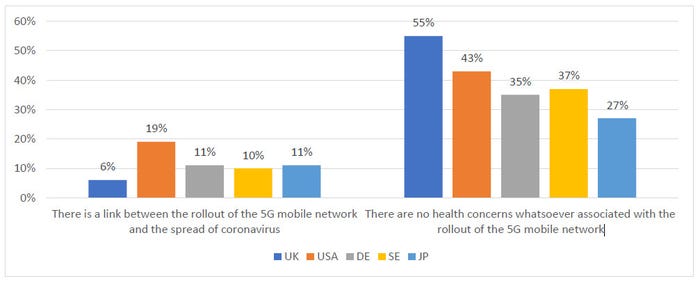Brits are among the least concerned about 5G and healthBrits are among the least concerned about 5G and health
New research from strategic communications consultancy Kekst CNC reveals that the UK is one of the countries with the fewest worries about the health implications of 5G.
June 11, 2020

New research from strategic communications consultancy Kekst CNC reveals that the UK is one of the countries with the fewest worries about the health implications of 5G.
That comes as something of a surprise, given the vigour with which our nutters set about telecoms gear in April. But it looks like that spasm of vandalism was not only brief, but totally unrepresentative of the average British punter. As you can see from the table below, UK respondents were the least likely to think there’s a link between 5G and coronavirus and the most likely to think There are no health concerns whatsoever associated with the rollout of 5G.

“With every new generation of mobile network technology comes new concerns around health,” said James Johnson, Senior Advisor at Kekst CNC. “While mobile network operators will be pleased that the public has rightly ruled out a link with COVID-19, they will be worried about the broad association that 5G can be detrimental to health. Even before this pandemic, mobile operators were dusting off their health issue management playbooks, but our research highlights that there is still a lot of education to be done before these negative associations are completely dispelled.”
We got a look at some more of the data, specifically the second question, and found that a sizable minority of respondents disagree with the statement that 5G poses no health risk. In the UK 15% either slightly or strongly disagree with the statement, in the US it’s 17% and in Germany and Sweden it’s 19%. Those who weren’t sure either way were strongly represented too.
In the UK the 35-44 age bracket was most likely to disagree, which is probably a result of heightened parental protectiveness. People were more likely to disagree as you go down the economic scale and London (not Liverpool) was the region most likely to disagree. Those demographic trends weren’t very closely matched in other countries, however, so it’s hard to read too much into them.
“Though significant majorities dismiss a clear link between 5G and coronavirus, conspiracy theories prey on doubt,” said Johnson. “This research shows that significant numbers are unsure that 5G is free of any impact on health, across the UK, Europe, Japan and the United States. In all these countries, the telecoms industry and governments alike should not assume the 5G conspiracy has gone away – it still lingers, and major players will need to navigate this issue carefully as 5G rolls out.”
It’s bad luck for the telecoms industry that the commercial launch of such a significant technological evolution should coincide with an exceptional global health crisis. As Johnson says, we should avoid complacency and keep working to educate the world about the scientific realities of low frequency electromagnetic radiation. If there are subsequent peaks of this pandemic, it would be nice to avoid another spate of telecoms vandalism.
About the Author
You May Also Like










.png?width=300&auto=webp&quality=80&disable=upscale)


_1.jpg?width=300&auto=webp&quality=80&disable=upscale)